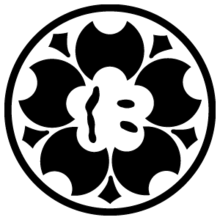Dojin-kai

Daimon of Dojin-kai
|
|
| Founding location | Kurume, Fukuoka, Japan |
|---|---|
| Years active | Since 1971 |
| Membership (est.) | 850 – 1,000 |
| Allies | Kudo-kai, Sinaloa cartel, Taishu-kai, Kumamoto-kai) |
| Rivals | The Kyushu Seido-kai and the Yamaguchi-gumi |
The Dojin-kai (道仁会 Dōjin-kai?), or "Dojin group", is a yakuza organization headquartered in Kurume, Fukuoka, on the Kyushu island of Japan, a designated yakuza syndicate, with approximately 850 members.
As well as being known as a militant yakuza organization, the Dojin-kai has also been known as a de facto drug cartel, as its activities have allegedly included large-scale drug trafficking, specifically methamphetamine trafficking, which is traditionally shunned in the yakuza world.
With its activities of drug trafficking, the Dojin-kai has allegedly been Japan's largest wholesale dealer in drugs since the late 20th century, after the disbanding of three other yakuza groups based in northern Kyushu; Tagawa-based Sadaoka-gumi, known as "[Japan's] Methlord in the Showa era" which was crushed by the Taishu-kai, Okawa-based Hamada-kai, and Kumamoto-based Yamano-kai.
The Dojin-kai was formed in 1971 from four old yakuza groups united by the first president, Isoji Koga (former bakuto yakuza born 1934). Seijiro Matsuo, the Secretary General of the first-generation Dojin-kai, succeeded as the president in 1992. In the same year, 1992, the Dojin-kai was registered as a designated boryokudan group under the Organized Crime Countermeasures Law.
...
Wikipedia
